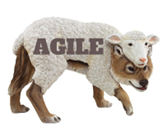Agile is a mindset.
Agile is not about five Scrum ceremonies (Sprint Planning, Daily Scrum, Sprint Review, Sprint Retrospective, Backlog Refinement) that make up a Sprint.
Agile is not a menu of things from which you can cherry pick. This is a system. Agile teams are dedicated teams. They have a single purpose, a clear objective, a protector, a product owner who guides and shepherds the team along.
If your mindset, culture and management team still live, breath and practice SDLC, having a Scrum Master, JIRA, Confluence, User Stories Backlog, Velocity and labeling Agile will NOT make any difference unless you truly believe in following principles:
- #1 Satisfy Customers Through Early & Continuous Delivery
- #2 Welcome Changing Requirements Even Late in the Project
- #3 Deliver Value Frequently
- #4 Break the Silos of Your Project
- #5 Build Projects Around Motivated Individuals
- #6 The Most Effective Way of Communication is Face-to-face
- #7 Working Software is the Primary Measure of Progress
- #8 Maintain a Sustainable Working Pace
- #9 Continuous Excellence Enhances Agility
- #10 Simplicity is Essential
- #11 Self-organizing Teams Generate Most Value
- #12 Regularly Reflect and Adjust Your Way of Work to Boost Effectiveness.
Points to Note:
- Successful use of Scrum depends on people becoming more proficient in living five values: Commitment, Focus, Openness, Respect, and Courage.
- The fundamental unit of Scrum is a small team of people, a Scrum Team. The Scrum Team consist of on Scrum Master, one Product Owner, and Developers. Within a Scrum Team, there are no sub-teams or hierarchies. It is a cohesive unit of professionals focuses on one objective at a time, the Product Goal.
- Scrum Teams are cross-functional, meaning the members have all the skills necessary to create value each Sprint. They are also self-managing, meaning they internally decide who does what, when and how.
- The Scrum Team is small enough to remain nimble and large enough to complete significant work within a Sprint, typically 10 or fewer people.
- The Scrum Team is responsible for all product related activities from stakeholder collaboration, verification maintenance, operation, experimentation, research and development, and anything else that might be required. They are structured and empowered by the organization to managed their own work. Working in Sprints at a sustainable pace improves the Scrum Team’s focus and consistency.
- The entire Scrum Team is accountable for creating a valuable, useful Increment every Sprint. Scrum defines three specific accountabilities within the Scrum Team: the Developer, the Product Owner, and the Scrum Master.
You are not Agile if you, your team and manger:
